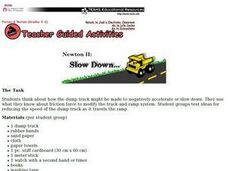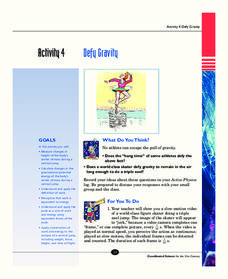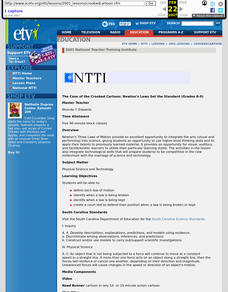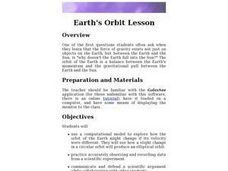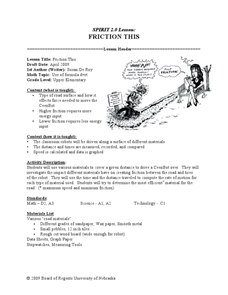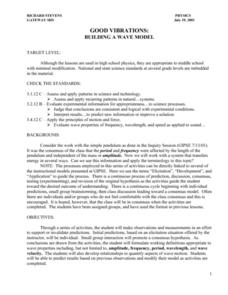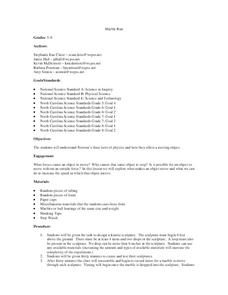Curated OER
Newton II; Slow Down
Students, in hands-on activities, explore how a dump truck might be made to negatively accelerate or slow down. They participate in activities using friction force to modify the truck-and-ramp system. Student groups test ideas for...
Curated OER
Looking For Newton
The lesson has sufficient background information for the teacher to implement the lesson. Students are asked to summarize the three laws of motion. They also conduct classroom activities to role play the Laws of Newton.
Curated OER
Numerical Determination of Drag Coefficients
Young scholars create a video of an object falling with a drag. In this physics instructional activity, students calculate drag coefficient using data from Logger Pro. They calculate velocity and acceleration of the object.
It's About Time
Defy Gravity
Test the limits of gravity while encouraging full class participation with this thrilling lesson. Pupils investigate the meaning of work and how it is equivalent to energy. They explore the joule and apply it as a unit of work. They...
Discovery Education
Jets in Flight
This Discovery Education activity provides the information needed to understand the basics of flight. Before taking off, young pilots learn the eight stages of the engineering design process. Small groups then design and build...
Curated OER
Impulse/Momentum Lab
Students investigate the relationship between force and momentum using motion detectors and sensors. In this physics instructional activity, students graph experimental results. They calculate impulse using the area under the graph.
Curated OER
Race the Track! Jump the Gap
Students record data of using a track system with variables and how those variables affect a ball used in the track. In this track lesson plan, students design their own track in groups, test the ball's rates of speed, and record their...
Curated OER
Simple Machines make work easier.
Students examine how simple machine work can make work easier. In this machines lesson students complete an activity that shows them what makes up a machine, and how to measure displacement and velocity.
Curated OER
The Case of the Crooked Cartoon: Newton's Laws Set the Standard
Students have the opportunity to use higher-level thinking skills and to apply their talents to previously learned material. It provides an opportunity for visual, auditory, and tactile/kinetic learners to utilize their particular...
Curated OER
Earth's Orbit Lesson
Tenth graders devise a computational model to explore how the orbit of the Earth might change if its velocity were different. Using accurately recorded data, 10th graders defend a scientific argument.
Curated OER
Fantastic Friction!!!
Students work in small groups to list at least 10 items that have movement or motion choosing one item from the list to use as a topic for the following questions: How does this item move? How can we slow down the movement? How can we...
Curated OER
That Mu You Do
Students are told that the weight of a car is equal to its mass multiplied by the acceleration due to gravity. When a car is at react on a horizontal road, there must be a normal force with which the road pushes up on the car to keep it...
Curated OER
Catapults!
Students work together to discover the relationship between the angle of catapults and the flight of different objects. They discover the heavier the object the more force is needed. They examine how engineers use this information to...
Curated OER
The Science of Swinging
Students learn how a pendulum works in the concept of an amusement park ride. In this pendulum lesson, students are introduced to Newton's first law of motion and how it works in an amusement park ride. Continuous motion and inertia are...
Curated OER
Worksheet 20
In this math worksheet, they write down and solve a differential equation governing the motion of an underdamped spring. Then they find the solution to the initial value problem.
Curated OER
Friction This
Students investigate road surface and calculate speed. In this algebra lesson, students analyze the roughness of a road and calculate distance and speed based on friction. They relate friction and energy to speed.
Curated OER
Good Vibrations: Building a Wave Model
Students assess and apply recurring patterns in natural systems. They evaluate the wave properties of frequency, wavelength, and speed as applied to sound. Students develop a relationship to quantify aspects of wave motion. They predict...
Curated OER
Marble Run
Learners use marbles to conduct experiments on movement of objects and explore Newton's three laws of motion. In this motion lesson plan, students use marbles, tubing, foam, paper cups, and more.
Curated OER
Blowin' In The Wind
Learners predict and hypothesize the reasons for wind movement. After viewing a video, they describe the effects of a high and low pressure system and what makes the wind blow. In groups, they construct instruments that measure air...
Curated OER
Collision Course
Students measure the speed of moving marbles and use the results to calculate velocity and momentum. They analyze the events preceding a Japanese train crash.
Curated OER
Air Has Pressure
Seventh graders analyze evidence about particles and the exertion of air pressure. They observe an experiment with a hard boiled egg. fire and a bottle to discover the heating, cooling, and speed of air particles. They write explanations...
Curated OER
IPC Physics
In this physics review worksheet, students compare inertia and momentum, insulators and conductors, and series and parallel circuits. Students review Newton's laws. This worksheet has 20 fill in the blank, 12 matching, and 20 problems to...
Curated OER
Scooting Along!
Students investigate how Newton's Third Law affects vehicle design. In this Newton's Third Law instructional activity, students use a web site to research Newton, his third law, and how to design a vehicle that uses a balloon for power....
Curated OER
The Beaufort Scale: A Local Model
Students study the Beaufort Scale and use it to study wind in their community. In this wind study lesson, students watch a DVD about climate change and learn about the Beaufort Scale. Students complete a worksheet for the topic.


